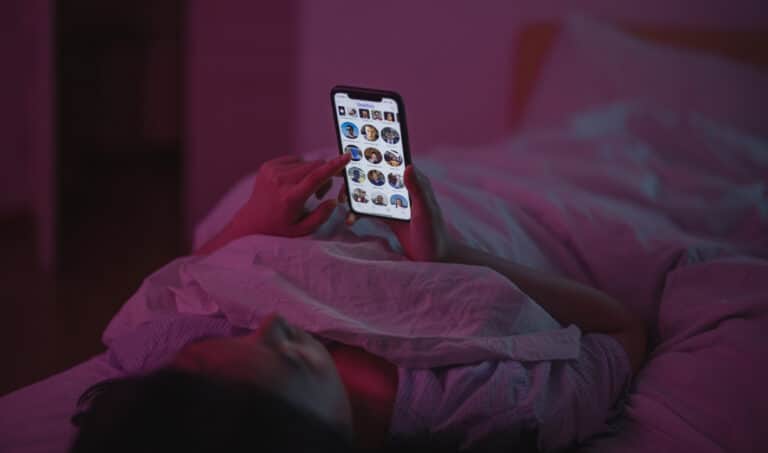Facebook is now testing a video speed dating app called Sparked for ‘kind daters’
Video dating is a fairly recent concept which blew up over the pandemic, all thanks to social distancing. Ever since Bumble dipped its toes into video dating in 2019, major players in the market including Tinder, Hinge and Hily were quick to follow by incorporating the feature into their own coveted apps. One of the most recent players to crop up on the scene is Facebook—testing a video speed dating platform with no public profiles, swiping or Direct Messaging (DMs).
“Sparked is an early experiment by the New Product Experimentation (NPE) Team,” a spokesperson for Facebook confirmed to TechCrunch. “We’re exploring how video-first speed dating can help people find love online.” Currently undergoing a “small, external beta test” designed to generate insights in order to improve experiences, the app is yet to go live on Google Play and App Store.
However, one can presently access Sparked via its dedicated website. Since the beta testing is region specific, the portal is accessible only to users in the US (or those with VPNs bouncing off their IP addresses to every corner of the planet).
A commitment to kindness
Describing itself as “video dating with kind people,” Sparked sports a plethora of features aimed at promoting kindness in the dating sphere. Promising the absence of public profiles, swiping and DMs altogether, the speed dating app puts users registered in a speed dating event nearby on a series of virtual dates lasting four minutes each. If ‘sparks’ literally fly between you and your potential partner, the app then schedules a second date lasting ten minutes. From there on, Sparked suggests users to exchange contact information and stay in touch through Instagram, iMessage or email—self promotion at its very best.
During a test experience at a Chicago Date Night event, The Verge attempted to set up a profile on the free app via a Facebook account. “The user sign-up flow suggests kindness is a key theme for the app,” the publication noted, outlining prompts along the lines of “be kind,” “keep this a safe space” and “show up for the date” featured in the onboarding process.
While signing up, users are asked to commit to this positive dating experience by explaining what makes them a ‘kind dater’. These responses will then be “reviewed by a human at Sparked” before users can gain access to the platform and go on speed dates. Users also have the option to choose their gender preferences listed between men, women and nonbinary individuals. They are then directed to a page asking them if they’re open to date trans people as well.
#Facebook is testing a #video speed-dating app called Sparked https://t.co/jzzxjdfCxC pic.twitter.com/0WXkbnlwIg
— SMC | LA (@smcla) April 14, 2021
Facebook’s incognito crush on our love lives
Before we break down Facebook’s increasing obsession with our love lives, let’s touch upon the fact that Sparked is not the tech giant’s first attempt at entering the dating sphere.
In 2019, Facebook Dating began its operations in the US—recently arriving in the UK. Marketed as a “relief to the loneliness caused by confinement of the COVID-19 pandemic,” the service essentially operates within the main Facebook app. Similar to mainstream dating apps, Facebook Dating lets users view each other’s public profiles, send a ‘like’ and wait for a ‘match’ to start a conversation.
In the early days of the pandemic, however, Facebook announced a new video calling feature that will allow users of its Facebook Dating service to connect via Messenger. While this can be appreciated as a timely move in order to compete with other dating apps and tap the upcoming market segment, it makes one wonder about Facebook’s commitment to Sparked with ‘video calling’ as one of its major features in the first place. The built-in video experience could potentially compete with Sparked—unless the new product’s goal is to become another feature inside Facebook Dating in itself.
TODAY ON FB LIVE: Um, I chatted about Facebook's new speed dating app called "Sparked."
— Diana Gutiérrez (@DGutierreztv) April 14, 2021
The video calls are set at 4 MINUTES, but you can extend it to 10!
What can you possibly get talking about in less than 5?! leave a comment! lol
Head to @WISN12News FB.
The sceptical way forward
Although Sparked hopes to cater to the increasing list of users who are sick of swiping and filtering through hundreds of profiles, analysts warn against Facebook’s success in the dating sector. “People don’t see Facebook as a place to go for online dating,” said Scott Kessler, an analyst at the research consultancy Third Bridge, in an interview with Market Watch. Even though the service has “novel features and functionality,” Kessler highlighted how the tech giant’s history with user data acts as a potential barrier for success.
“I do think there is a level of scepticism or concern regarding how the company and the property accesses and utilises people’s personal information and data,” Kessler added. “It makes launching this particular property and gaining traction perhaps more challenging than people might have expected.”
A glance into the statistics of the existing dating sector lands an even bigger blow on Facebook’s efforts. As Tinder’s direct revenues increased by 18 per cent year-over-year to $1.4 billion in 2020, Bumble topped all of its revenue estimates in the first quarter, pulling in $165.6 million in the fourth quarter of that same year. Facebook, on the other hand, only has one achievement to date to list on its portfolio: 1.5 billion Facebook Dating matches in 20 countries. Not to break Facebook’s bubble or anything, but a ‘match’ may not necessarily indicate a successful pairing either.
With that being said, Sparked can currently be counted as an experiment. It might have the potential to launch globally in the near future, be merged into Facebook Dating or shut down completely. Only two factors can confirm our suspicion—time or another data breach.





